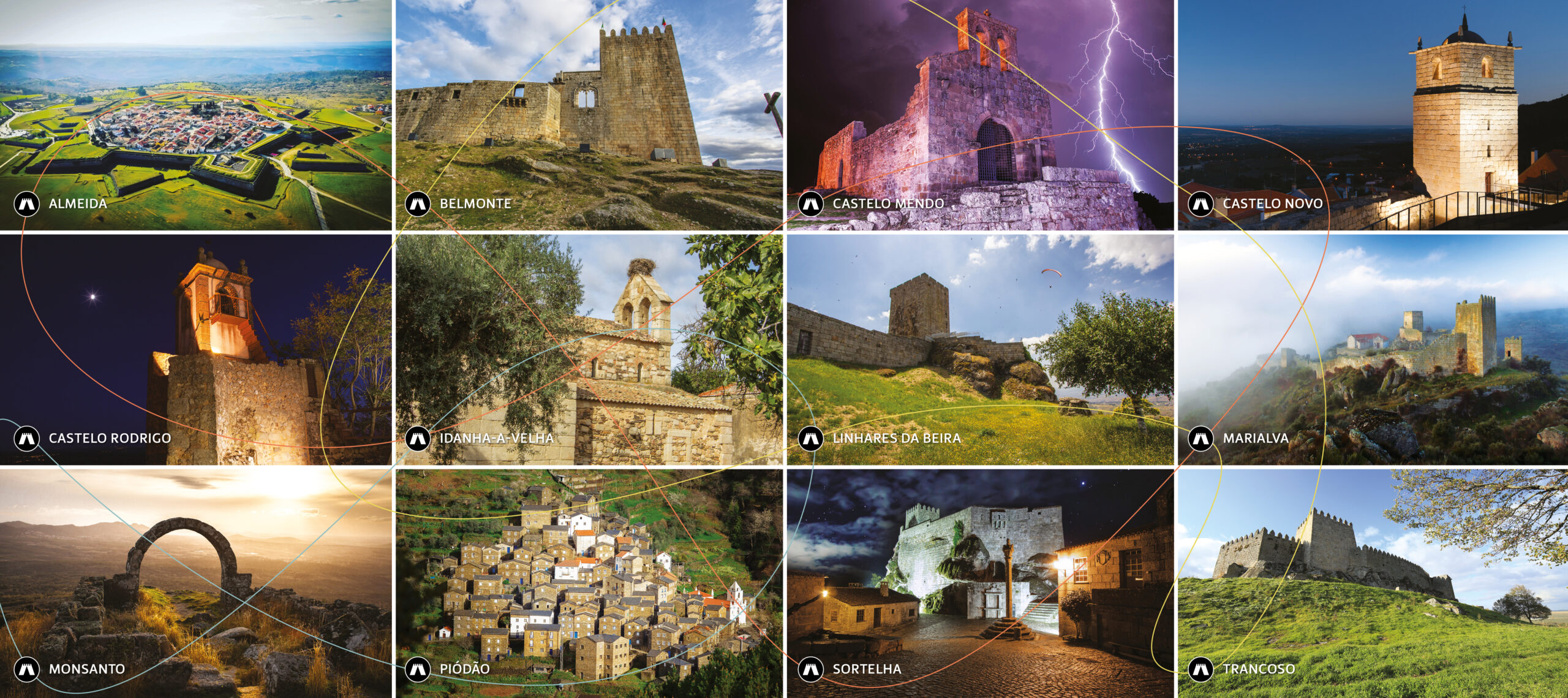
Historic Villages of Portugal 2030 PROVERE
Historical Villages of Portugal

PROVERE AHP Collective Efficiency Strategy
The territory of the Historical Villages of Portugal (AHP) is recognised as having a number of elements that differentiate it, namely those associated with its material identity, based on its architectural and natural heritage, and immaterial elements, referring to its historical and cultural heritage (activities, traditional techniques, customs and traditions), influenced by the setting of the Historical Villages of Portugal in the physical environment and geographical location. The differentiating elements of the endogenous resource
The synergies and strong complementarities established between them are responsible for the affirmation of an economic specialisation based on tourism and the enhancement of local products through the development of production systems.
In line with the need to give continuity and consistency to the PROVERE strategy defined in the previous programming period, Aldeias Históricas de Portugal - Associação de Desenvolvimento Turístico (AHP-ADT) has taken on the challenge of continuing the work through a vision that encompasses the goal of sustainable development, representing a medium-term prospective scenario, based on a logic of valuing the experience of the Network and the opportunities arising from the 2021-2017 framework, following national and European guidelines on sustainability, competitiveness and social cohesion. In this way, it is intended that, by 2030, the Network of Historic Villages of Portugal will be distinguished by the valorisation and preservation of its endogenous resource, through the classification of the 12 agglomerations, along with the commitment to climate transition and sustainability, which are established as strong areas in the fight against climate change, with an impact on improving the quality of life of local communities. This vision also reflects the importance of boosting the economic base, using research and innovation to develop products that leverage the Network's value chains. It also emphasises the recognition and consolidation of the AHP brand and the territory, reinforcing its position as a destination of excellence in the national and international markets. In view of the above, the following vision of the future is adopted:
Network of Historic Villages of Portugal: a sustainable and innovative low-density territory, pioneering in its ecological commitment and contribution to the demographic and socio-economic sustainability of the inland centre.
The aim is for EEC 2030 to be aligned with and constitute a facilitating and guiding instrument for the fulfilment of the AHP Benchmark. In this qualifying framework, complementary to the heritage and urban qualification dimension, multifunctionality is particularly important, relating not only to support for tourist dynamics but, more importantly, to support for the daily dynamics of the resident community and strengthening the demographic attraction and retention capacity of these historic centres, which involves a consequent focus on areas of specialisation.
This vision also reflects the importance of boosting the economic base, using research and innovation to develop products that leverage the Network's value chains and qualify local companies. In view of the above, and inseparable from a common strategic framework in the field of urban regeneration and upgrading that allows the unique characteristics of the Network to be maintained, i.e, maintaining the endogenous resource that underpins the strategy of valorising this low-density inland territory, creating the conditions for economic activation is essential, but complex and demanding both in terms of the range of actions (immaterial and material) and the commitments and entities to be involved in order to create a context conducive to the economic activation of the villages, supporting new service models, creating the conditions for new entrepreneurs and creatives to choose to live and work in the AHP and facilitating the physical rehabilitation of the villages with the comfort and safety conditions that make them attractive without ever compromising their uniqueness and unique heritage value.
This will help to overcome a fragile demographic context, characterised by progressive population losses (across the interior of the country and exacerbated in villages throughout the country), which create a fragile situation that requires integrated intervention if it is to be reversed.
The climate agenda, already included in the AHP Network's strategic and action framework, remains central, namely the implementation of the measures set out in the 12 AHP's ESCP. As a result of adherence to the Covenant of Mayors, the challenge is to create a network of efficient villages. To this end, it is essential to act on public policies linked to economic/productive activities, mobility, buildings, energy efficiency, management of public spaces and efficient use of natural resources.
EEC PROVERE AHP reinforces 4 areas of specialisation, which constitute the smart specialisation sectors of the AHP Network and which are intended to be strengthened and qualified, making the Network more competitive and a benchmark at national and international level:
- sustainable tourism: Strengthening AHP's position as a sustainable tourist destination that differentiates itself by valuing its strategic assets and pursuing an integrated approach to communication, animation, qualification and sustainability in the sector, supporting economic agents (i) in the transition to operating models that are carbon neutral and (ii) more open to international markets and, consequently, contributing to the affirmation of the AHP Network as a destination of excellence for Rural Tourism(Best Tourism Village).
- cultural and creative industries: Promote the multifunctionality of the AHP network as a privileged stage for a responsible creative cultural sector that values and promotes the unique assets and traditional know-how that will enable the creation of unique content and products with a sustainable stamp in diverse areas such as audiovisual, cinema, handicrafts, fashion, etc.
- Sustainable agriculture and biodiversity: Revitalising the agricultural, livestock and forestry economy as key components of a sustainable development model based on quality production and local consumption, with an impact on protecting and enhancing rural ecosystems.
- rehabilitation and sustainable construction: Affirm the AHP as a centre of knowledge and specialisation in the field of innovative urban intervention in territories classified as heritage sites and with architectural and urban characteristics to be preserved and enhanced.
In light of the above, the areas of specialisation will respond to the challenges highlighted by focusing on:
- creating economic value from endogenous resources: by highlighting the multifunctionality of the AHP resource as a result of its context/conditioning factors, resources and identity elements that shape the territory and allow for the diversification of the local economic base based on sectors with strong development potential (in the 4 areas of specialisation: sustainable tourism, cultural and creative industries, sustainable agriculture and rehabilitation and sustainable construction).
- in the transfer of knowledge and innovation associated with the exploration of new ways of making the most of resources: by promoting innovation through support for scientific research and facilitating the transfer of knowledge to the local economic fabric, and the exploration of new, more sustainable and creative approaches, through the valorisation of culture, identity and traditional know-how in the 4 areas of specialisation.
- in the digital transition: through the exploitation of digital in the protection and enhancement of resources, in the development of new approaches to promoting the products and services offered by the AHP network, in social inclusion, in the training of agents and in raising awareness of sustainability, with an impact on the 4 areas of specialisation.
- in the green transition: by implementing new models of development and valorisation based on sustainability, supporting economic agents in the transition to carbon neutral models in the 4 areas of specialisation;
- stimulating entrepreneurship in rural areas: based on entrepreneurial discovery processes that generate qualified business initiatives based on the resource and its 4 areas of specialisation, adapted to the specific characteristics of this low-density territory.
AHP 2030 Consortium
The AHP 2030 Consortium reflects strong coordination between local, regional, national and international players, fostered by a culture of partnership and networking. The formalisation of membership results from the entities joining the partnership in one of the following ways (i) by signing the Consortium contract; (ii) by signing cooperation protocols with the AHP-ADT on matters that directly contribute to the thematic focus of "EEC PROVERE AHP 2030".
In order to define the partnership, Aldeias Históricas de Portugal - Associação de Desenvolvimento Turístico launched a process of strategic reflection, mobilising, from the outset, the public and private agents involved in building the EEC, committing them to the sustainable development of the AHP. It should be noted that, in addition to those working in the territory, supra-local entities with competences in the areas of strategic specialisation were involved, which are important for the success of the "EEC AHP 2030" and will contribute to the fulfilment of the objectives and targets by the end of 2030.
As part of the preparation of this AHP 2030 strategy, the areas of specialisation and strategic focus were widely debated and negotiated, and the process culminated in the creation of the various instruments and the commitment of the stakeholders to the sustainable development of the AHP and the materialisation of the recommended guidelines in an Action Plan to operationalise it.
The moments of mobilisation of the community and agents of the territory for the construction of this strategy are mentioned, among them the following: Village Meetings (the most recent took place between January and March 2022 - 2 sessions in each AHP), Meetings with Parish Councils (23 November 2023), Board Meetings (the most recent on 11 October 2023), AHP Assembly Meetings (the most recent on 30 October 2023), Consortium Meetings (8 February 2024). There was also direct contact with institutional bodies and private promoters (various) to present the EEC's strategic lines, for example contact with the Intermunicipal Communities (CIM BSE, CIM BB, CIM RC), Local Development Agencies/Local Action Groups (PRO-RAIA, RUDE, ADRUSE, ADIBER, ADRACES, RAIA HISTÓRICA, ADISGATA), the Scientific and Technological System (IPCB, UA, UNL, IPG, IPP, etc. ), local/regional business associations (NERC, AEBB, NERGA, ADES, Smart Waste, Gardunha Viva, Nest, LAIFV, etc.), institutional bodies (ERT-TCP, ARPT CP, Património Cultural, ADENE, Portugal Film Commissioner, Ordem dos Arquitetos, Ordem dos Engenheiros, LNEC, LNEG, etc.).
In this area, an effort has been made to coordinate the intervention of the AHP with other PROVEREs, whose thematic focus is complementary to that of the AHP.
It should also be noted that the implementation of the AHP 2030 JU provides for a governance model that includes various organisations with different areas and levels of activity and, consequently, with distinct and well-defined responsibilities, ensuring active participation during the implementation period (2024-2030).








